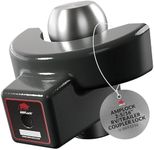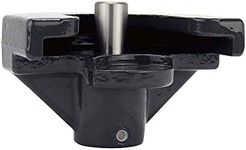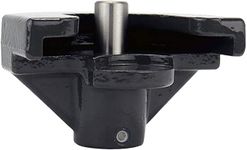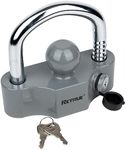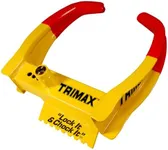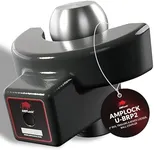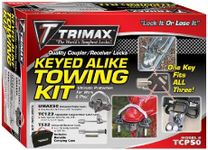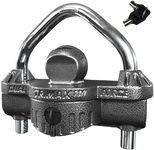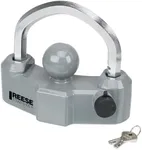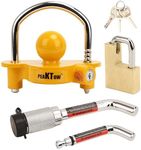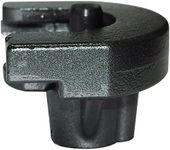Buying Guide for the Best Boat Trailer Lock
Choosing the right boat trailer lock is essential for protecting your boat and trailer from theft. With so many options available, it’s important to understand the key features that make a lock effective and suitable for your needs. The best approach is to consider where and how you’ll use the lock, the level of security you require, and how convenient it is for you to use regularly. By focusing on the main specifications, you can confidently select a lock that balances security, ease of use, and durability.Lock TypeThe lock type refers to the design and mechanism used to secure your trailer, such as coupler locks, hitch pin locks, or wheel locks. This is important because different types offer varying levels of security and convenience. Coupler locks fit over the trailer hitch, hitch pin locks secure the hitch to the tow vehicle, and wheel locks clamp onto the trailer wheel. If you want a quick and visible deterrent, a wheel lock might be best. For long-term storage, a coupler lock can be more secure. Consider how and where you park your trailer to decide which type fits your needs.
Material and Build QualityMaterial and build quality determine how resistant the lock is to tampering, cutting, or weather damage. Most locks are made from hardened steel, aluminum, or alloys. Hardened steel offers the best resistance to cutting and prying, while aluminum is lighter but less secure. If you store your trailer outdoors or in high-risk areas, prioritize heavy-duty, weather-resistant materials. For occasional use in safer environments, lighter materials may suffice.
Locking MechanismThe locking mechanism is how the lock secures and releases, such as key, combination, or push-button systems. This matters because some mechanisms are easier to use or more resistant to picking. Keyed locks are common and reliable, but you need to keep track of the key. Combination locks remove the need for a key but can be less secure if the code is simple. Choose a mechanism that matches your preference for convenience and your need for security.
Size and FitSize and fit refer to how well the lock matches your trailer’s specific dimensions, such as the coupler size or wheel width. This is crucial because a lock that doesn’t fit properly won’t secure your trailer effectively. Locks often come in different sizes or adjustable models. Measure your trailer’s hitch or wheel before buying, and check the lock’s compatibility to ensure a snug, secure fit.
Weather ResistanceWeather resistance indicates how well the lock can withstand exposure to rain, snow, and sun without rusting or seizing up. This is important if your trailer is stored outdoors. Look for locks with rustproof coatings, sealed keyways, or weatherproof covers. If you live in a wet or coastal area, prioritize high weather resistance to ensure the lock remains functional over time.
Visibility and DeterrenceVisibility and deterrence refer to how noticeable the lock is to potential thieves. Brightly colored or bulky locks can discourage theft simply by being obvious and hard to remove. If you want to prevent theft before it starts, choose a lock that stands out and looks difficult to defeat. For added peace of mind, combine visible deterrence with strong security features.
